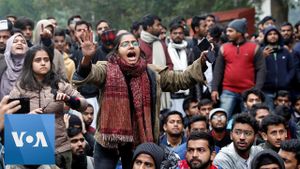Saudi filmmaker Abdulaziz Alshlahei's drama Hobal is making waves at the box office, demonstrating how local narratives can resonate deeply within home countries. Since its release on January 2, 2025, this film has outperformed several Hollywood blockbusters, including Disney's Mufasa: The Lion King, underlining its cultural significance.
Hobal tells the poignant story of a Saudi family caught between tradition and modernity during the early 1990s. Set against the backdrop of the Gulf War, it depicts how the grandfather's decision to isolate the family leads to crisis when the young girl becomes ill. This narrative not only showcases the struggles faced by women but also addresses the overarching theme of challenging patriarchal structures. The mother’s fierce determination to fight for her child's health becomes symbolic of the larger conflict many women face.
According to reports from the Saudi Film Commission, Hobal has won over audiences, garnering over 500,000 admissions and amassing approximately $5.7 million at the box office. The film's success marks it as one of the standout releases this year, especially when compared to the weak performance of other genres. Disney's Mufasa has only attracted around 328,000 admissions and earned $4.4 million since its December debut, showcasing the stark difference between local content and Hollywood's appeal.
Hobal serves as more than just entertainment; it is a cultural touchstone for many Saudis. By forcing audiences to confront issues of gender roles and family dynamics, the movie resonates with viewers who see reflections of their societal struggles mirrored on screen. “A timely film which is hitting home with Saudi audiences,” remarked Nick Vivarelli of Variety. This poignant portrayal of motherhood and resilience strikes at the heart of Saudi Arabia's rapidly changing cultural fabric.
The success of Hobal is indicative of the growing market for domestic films within Saudi Arabia. The country has taken significant steps to support its burgeoning film industry, from easing regulations around cinema to actively promoting local filmmakers. Such initiatives have created fertile ground for stories like Hobal, which articulate the complex cultural identity of modern Saudi Arabia.
Overall, Hobal demonstrates the powerful intersection of storytelling and social commentary. By appealing to audiences' emotional core, it has carved out space at the box office traditionally dominated by Hollywood fare. This success could pave the way for more films similar to Hobal, allowing local filmmakers to share their narratives and, inch by inch, reshape the cinematic map.
With Hobal, Abdulaziz Alshlahei has not only created a film but sparked dialogue about the role of women and the importance of challenging outdated traditions. “Hobal has now pulled more than 500,000 admissions since its Jan. 2 release,” Alshlahei has observed, proud of the reception the film has garnered. The narrative of struggle against patriarchal norms is not just relevant here; it resonates universally, proving how local stories can strike chords far beyond their origins.
Looking forward, it remains to be seen how Hobal's success will influence future projects within the Saudi film industry. Will more filmmakers take the plunge and tackle societal issues head-on? The hope is certainly there, and if Hobal is any indication, the audience is ready and eager for these conversations.



